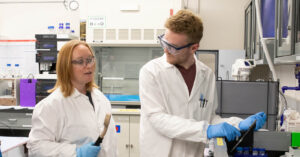
Alzheimer’s Disease affects nearly six million people in the U.S. today, a number expected to more than double by 2050. While current FDA-approved treatments can slow progression, they don’t reverse the disease—and come with serious side effects, including brain swelling. The question researchers are racing to answer is: Can we develop a safer, more effective way to break up the plaques that progress Alzheimer’s, and possibly reverse its course?
Tara Mastren is tackling this challenge head-on with a new approach: targeted alpha therapy (TAT). This method, often used in cancer treatment, delivers high-energy particles directly to harmful proteins—in this case, the amyloid beta (Aβ) aggregates that form plaques in the Alzheimer’s-affected brain. Dr. Mastren is working with University of Utah collaborators Dr. Andrew Roberts, Associate Professor of Chemistry and Dr. Donna Cross, Professor of Radiology to develop appropriate targeting compounds and study them in genetically engineering mice with Alzheimer’s.
Their research just received a major vote of confidence. The Society of Nuclear Medicine and Molecular Imaging (SNMMI) has awarded Dr. Mastren and her team $100,000 from its prestigious Mars Shot Fund, which supports bold, potentially game-changing ideas in nuclear medicine.
Continue reading at the Department of Civil & Environmental Engineering.